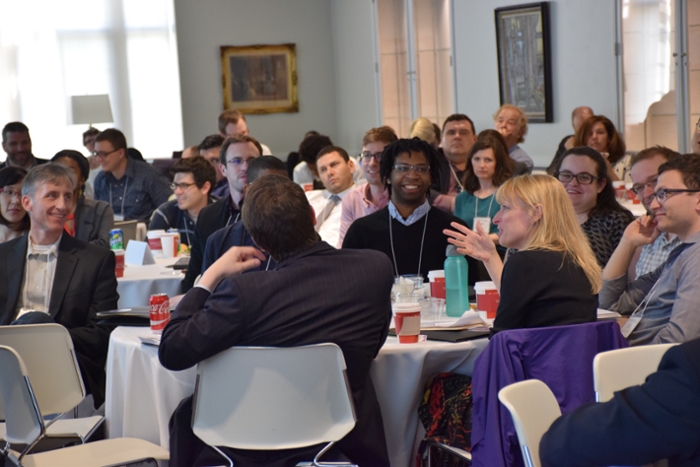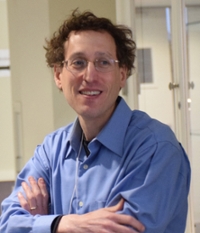How 'Magical Thinking' and 'Buy American' Shape Public Opinion
10th annual conference offers topical research for discussion
Get all our news
The motivation is to bring together scholars who are interested in political and social behavior, very broadly speaking, and to allow time for interaction to encourage collaboration and sharing ideas.”
James Druckman
IPR political scientist

The University of Pennsylvania's Diana Mutz (right) asks a speaker about public perceptions of corruption.
In the 10 years since it started, the annual Chicago Area Political and Social Behavior workshop has become a prime opportunity for the Midwest political science community to engage with leading social scientists on discussions of cross-disciplinary research—from a political scientist’s study of gender stereotypes to an economist’s take on probabilistic polling.
“The motivation is to bring together scholars who are interested in political and social behavior, very broadly speaking, and to allow time for interaction to encourage collaboration and sharing ideas,” said IPR political scientist James Druckman, who founded and organizes the event each year.

The University of Illinois’ Scott Althaus attended the very first workshop, and has repeatedly returned to his “favorite academic gathering.”
“Its small size, conversational atmosphere, and focus on just a small number of well-developed presentations makes CAB predictably the most stimulating academic event of my year,” Althaus said.
More than 100 faculty and graduate students took part in the 2016 workshop, held on May 6 on Northwestern’s Evanston campus. The four nationally recognized presenters covered intriguing aspects of public opinion related to trade, corruption, bipartisanship, and contradicting beliefs held by the same person.
Trade Preferences and In-Group Favoritism
Why are many Americans willing to pay a premium for products “Made in the USA”? According to the University of Pennsylvania’s Diana Mutz, such buy-American purchasing decisions are emblematic of rising levels of U.S. isolationist sentiment. In a national survey, the majority of American respondents did not see trade as benefiting their own country so much as it benefited other countries. Economic downturns, like the Great Recession, drive opposition to trade, she noted, even when trade is not seen as the cause of the downturn, as with the recent recession. Foreign countries serve as scapegoats for other economic forces, such as the impact of automation on manufacturing jobs. Mutz suggests that Americans see themselves as more deserving of the benefits of trade than foreigners. In addition, they favor policies that maximize their advantage over other countries, as if trade were a competition rather than an agreement intended to benefit both parties. “They are viewing trade as a competition, where what matters is not how much we gain—but how much more we get ahead of the other country,” Mutz explained.
Perceptions of Corruption
Researchers have studied political corruption, but few have examined what the public thinks of corruption. Thomas Holbrook of the University of Wisconsin-Milwaukee addressed this gap, using two data sets, the Urban Mayoral Election Survey and the 2014 Cooperative Congressional Election Study, to explore people’s perceptions of corruption in their states and their cities. About 57 percent of the more than 6,000 respondents somewhat or strongly agreed that a high level of corruption exists in their city, with Detroit, Miami, and Cleveland having the highest levels of perceived corruption. Even more perceived corruption existed at the state level, as 71 percent reported corruption in their state. Individual perception is affected by political party, racial representation in local government, and how “tuned in” to politics people are, Holbrook explained.
How Voters View Legislators Who Do Not Compromise
How do voters view legislative compromise, and under what conditions are policymakers punished for failing to reach compromise? IPR political scientist Laurel Harbridge explained that while legislators are generally viewed more positively when they compromise than when they do not (at least when legislative action is at stake), certain conditions provide “cushions” for legislators to avoid compromise without facing voter backlash. She and her colleagues found that voters are more willing to overlook a lack of compromise when their legislator belongs to the same party as the voter, and when they see the issue at stake as aligning with the legislator’s gender. For example, voters are more forgiving of male legislators who do not compromise on “male-dominated” energy issues—and female legislators who do not compromise on the more “female-oriented” issue of early childhood education. Voters are less forgiving, however, of legislators who refuse to compromise on issues considered outside of their expertise. The results emphasize the way in which voter penalties for not compromising can vary across legislators and political contexts.
“Magical Thinking” in U.S. Public Opinion
Fifty-two percent of Americans do not believe in evolution, 40 percent think dinosaurs and humans coexisted, and 20 percent say vaccines cause autism. All three are cases of what the University of Chicago’s Eric Oliver calls “magical thinking,” which occurs when someone assigns causes to phenomena that cannot be directly observed and which contradict other prevalent beliefs. Oliver discussed how such thinking shapes American public opinion. Using six nationally representative surveys, he has captured a spectrum of magical thinking, with “tangible” and “symbolic” thinkers at each end: Tangible thinkers are more likely to weigh real costs than symbolic costs, while symbolic thinkers are more likely to engage in magical thinking and hold intuition-based beliefs. Oliver focused on one symbolic group, in particular—fundamentalist Christians—to show how intuition-based thinking shapes beliefs across a number of issues. For instance, he explained that fundamentalists are more likely to hold conservative views across a range of issues—from “moral” ones like gay marriage to health issues such as banning GMOs—regardless of their political ideology. The findings suggest that many political beliefs can be traced back to whether someone engages in magical thinking rather than clear differences in political ideology.
James Druckman is the Payson S. Wild Professor of Political Science and IPR associate director. Diana Mutz is Samuel A. Stouffer Professor of Political Science and Communication, and Director of the Institute for the Study of Citizens and Politics at University of Pennsylvania. Thomas Holbrook is Wilder Crane Professor of Government at University of Wisconsin-Milwaukee. Laurel Harbridge is assistant professor of political science and an IPR fellow. Eric Oliver is professor of political science at the University of Chicago.
Published: July 19, 2016.